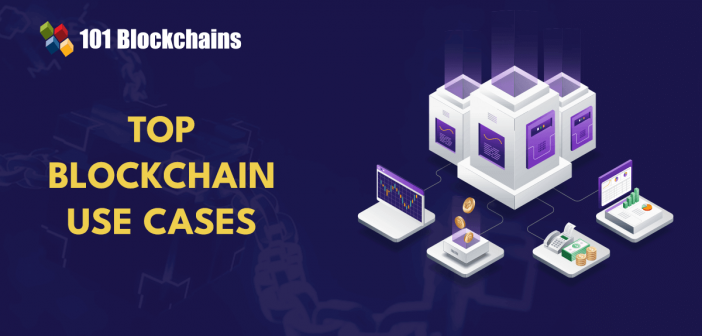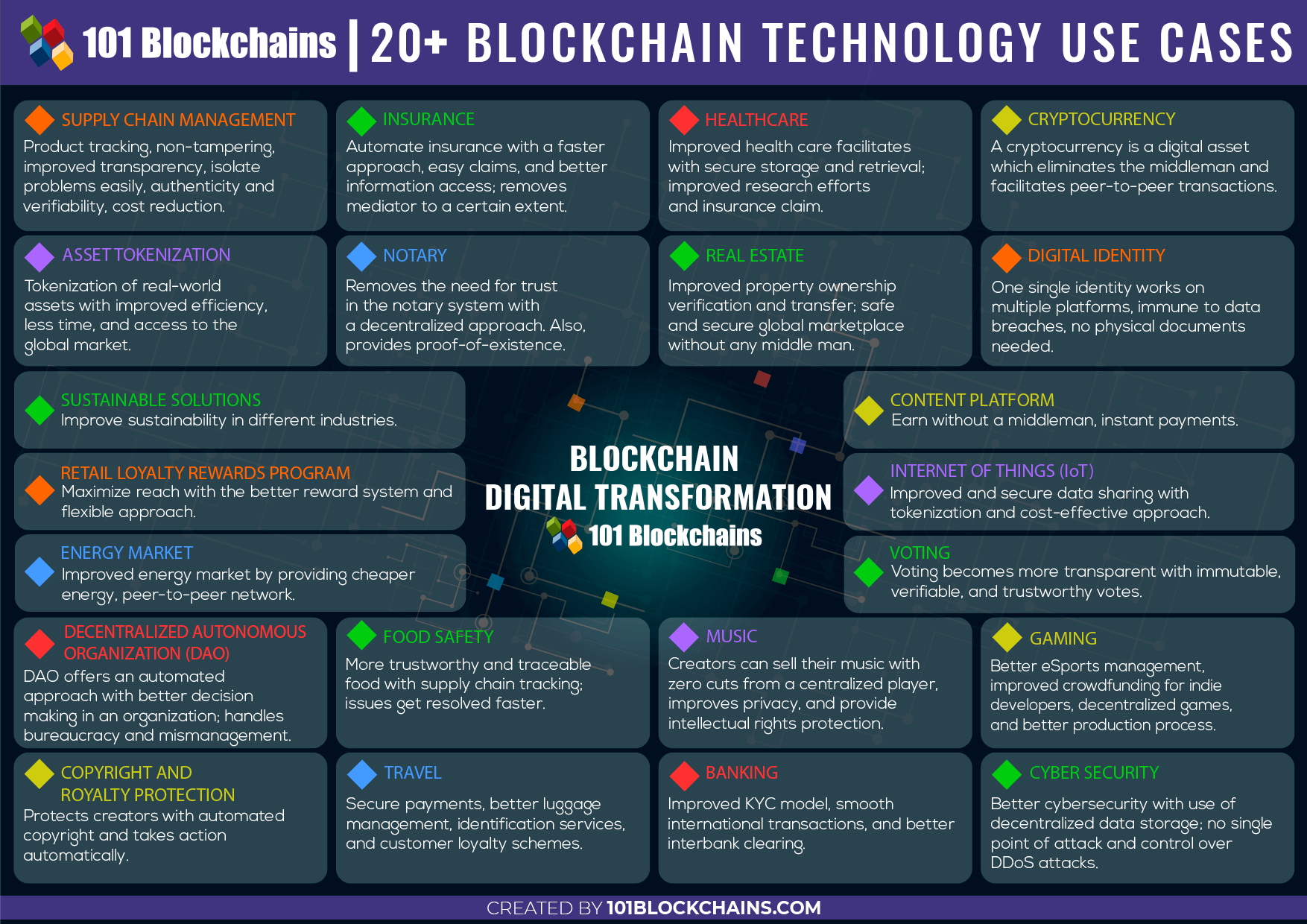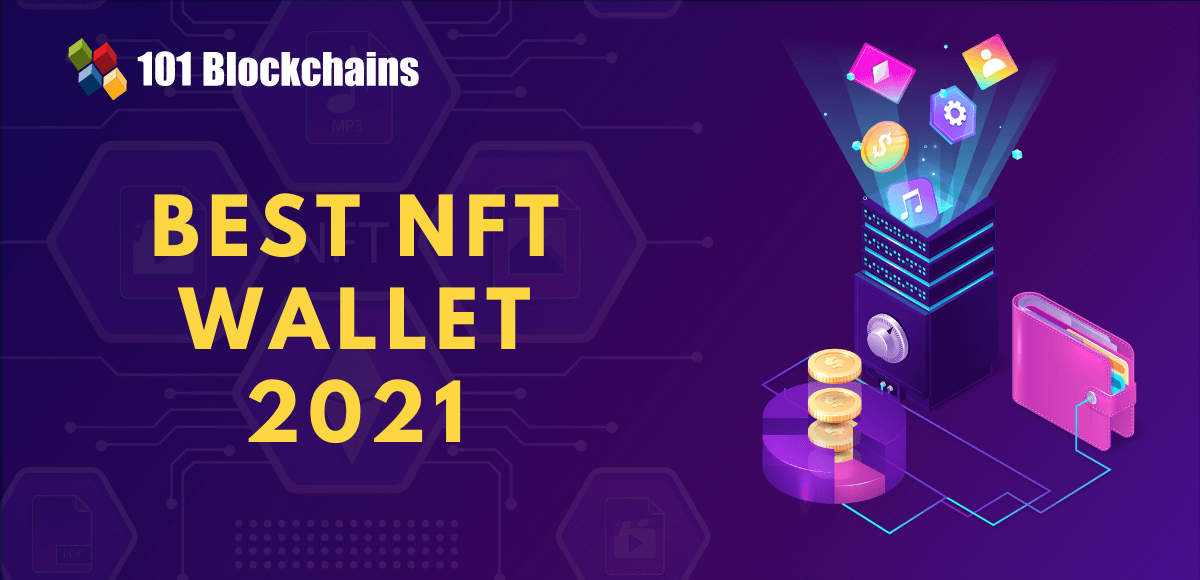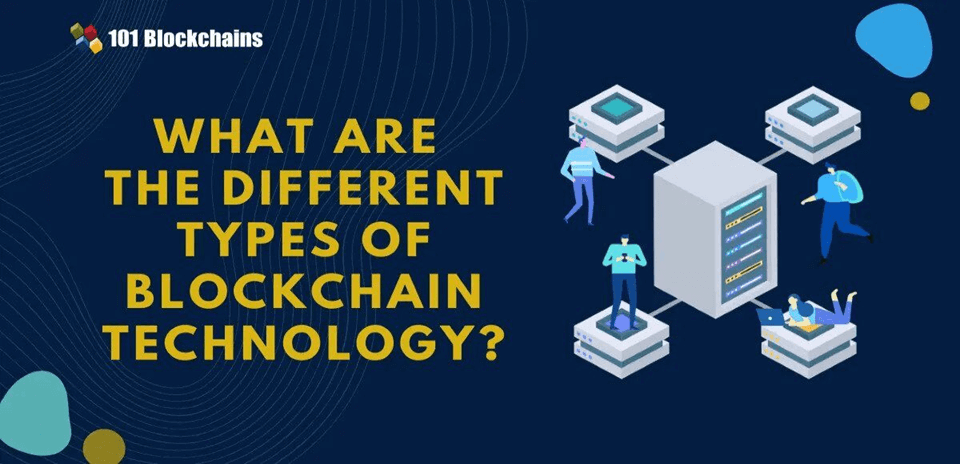Learn how blockchain truly works, master key definitions, and uncover what makes smart contracts so "smart." Dive into the fundamentals, gain valuable insights, and start your blockchain journey today!

- Reviews
101 Blockchains
- on July 02, 2019
Blockchain Usage: List of 20+ Blockchain Technology Use Cases
Do you want to know about blockchain technology use cases? If you do, then you have come to the right place. The blockchain technology use cases will help you understand the blockchain usage.
When technology evolves, it takes everyone by storm. This is true for blockchain as it is growing at a rapid pace. It is also a term that is put up by almost everyone in the industry. Blockchain is now at the core of technological growth in nearly every sector. It is now seen as a catalyst for change.
In this article, we will be going through blockchain usage in the current industry. To cover its usage correctly, we need to list the blockchain technology use cases. These use cases will give you a clear idea about blockchain usage. However, before we start, we will need to understand what is blockchain. Let’s get started.
Build your identity as a certified blockchain expert with 101 Blockchains’ Blockchain Certifications designed to provide enhanced career prospects.
What is blockchain?
In short, below are the key features of blockchain technology
- Decentralized – no central authority
- Transparent
- Secure
- Integrity
- Faster settlement.
Blockchain Usage – 20+ Blockchain Technology Use Cases
Blockchain’s ability to offer a solution without any centralization has opened a lot of options for its implementation. The blockchain technology use cases that we will discuss are the most interesting ones out there and showcases blockchain usage applications examples.
Let’s get started.
Supply Chain Management
One of the best blockchain usages is in supply chain management. The current supply chain management uses old methods. In return, we have a lack of transparency within the supply chain.
As there is no transparency and no way to recheck each and every moment of the supply chain, it becomes easy for the malicious actors to modify the supply chain management. In the end, both companies and end users suffer from counterfeit goods. This is a big problem.
The solution is blockchain based supply chain management. As it is a network between business and suppliers, a decentralized approach can solve the issues related to the supply chain. To achieve the desired result, the assets in the supply chain needs to be digitized.
Each product once digitized now carry a serial number or a unique identification number associated with it. This means that each asset can be monitored and tracked through the supply chain. Not only that, other vital information can be tracked and rechecked when needed. A decentralized blockchain-based supply chain management can easily record information such as time, location, product state, and so on.
In short, blockchain radically improves the supply chain efficiency and also repels the malicious actors that may want to tamper with it.
Benefits of Blockchain Technology Use Cases in Supply Chain Management
- Products are tracked accurately
- Tampering products not possible
- Improved transparency
- Ability to isolate problems and solve them
- End consumers don’t have to deal with a counterfeit asset
- Verification and authenticity are possible.
- Cost Reduction
Supply Chain Management Blockchain Projects
- Food Trust by IBM and Walmart
- Bext360 using blockchain to assign traceability to their coffee beans
- Target’s ConsenSource
Want to know more about supply chain in blockchain?, Enroll Now in Enterprise Blockchains and Supply Chain Management Course
Digital Identity
Identity theft is one of the 21st-century problems that have arrived on the internet. As of now, it is easy to do identity theft and extract information from a secure source by posing as someone else. That’s a massive problem for the general audience an even bigger problem for the enterprise who have critical data at stake.
Managing identity for an individual has also become a big problem as one has to carry a plethora of documents. It can include driving license, passport, national identity card, or any other identity document associated with the organizations they are working for.
The solution is to have one digital identity associated with a person. It can be achieved with the help of blockchain where a person has only one identity in the whole network. There are many benefits of using digital identity, including no need to carry documents. This also protects the individual from identity theft, which is one of the most significant issues right now.
Governments, on the other hand, can also make the most out of the digital identity. In conjunction with digital identity, governments can deploy voting in a decentralized environment. Digital Identity is a good example of blockchain usage.
Benefits of Digital Identity Blockchain Technology Use Cases
- One single identity
- No need to carry documents
- One digital identity can work on multiple platforms
- Not susceptible to data breaches
- Identity theft is no more possible
Digital Identity Blockchain Projects
- Hyperledger Indy — it covers decentralized identity
- Civic – self-sovereign ID system
- Evernym – self-sovereign ID
Want to understand the concept of decentralized identity in detail? Enroll now in Decentralized Identity Fundamentals Course
Asset Tokenization
Asset Tokenization is a crucial step towards protecting the real-world asset. There are many instances when dealing with real-world asset more efficiently. For example, if you want to sell a property, you need to do a lot of paper-work. Not only that, there are chances that you can instill errors, making the whole process even slower.
To make assets handling more efficient and practical, asset tokenization is done. It lets you expedite the process of selling and buying assets. It can mainly be used in real assets and in finance.
Blockchain technology plays a crucial role in tokenizing the illiquid assets and help them to be traded and settled on the blockchain. It completely ignores the standard way of resolving assets, improving efficiency, and saving time — making it one of the best blockchain usage.
Benefits of Asset Tokenization Blockchain Technology Use Cases
- Tokenization of illiquid assets
- Improves efficiency
- No need to go through a long process
- Saves times
- Helps small businesses, entrepreneurs, real-estate to channel investment
- Possibility of accessing assets that were only available to institutional investors
- Access to the global market
Asset Tokenization Blockchain Projects
- Polymath
- Harbor
- Alphapoint
Want to learn the fundamentals of tokenization? Enroll Now: Tokenization Fundamentals Course
Energy Market
The energy market is completely controlled by big players. We already know that if you want to get energy, you need to apply for connection and wait for installation. There are also cases where electricity is denied to individuals, startups, businesses, or even enterprises due to one reason or another. It is a closed market controlled by the corporation which leaves nothing for the general population.
Energy market can see a revolution when it comes to accessing and distributing energy. With blockchain, it becomes easy for individuals to generate, trade, record and settle energy — all with the help of smart contracts and distributed ledger technology. With the use of blockchain technology, energy becomes an asset, just like other commodities.
Anyone who can produce can participate in the network and make the most of the open market out there. So, the price of the energy depends on the demand and supply, rather than a fixed regulated price — which can be both a good or a bad thing. In short, the energy market can be revolutionized if there is a distributed electricity market where consumers can also act as producers, and vice versa. The whole setup can bring efficiency and bring 100% uptime for many areas of the industry.
Benefits of Energy Market Blockchain Technology Use Cases
- Prices depend on demand and supply
- No need to rely on one electricity producer
- Consumers can also participate in producing electricity
- 100% uptime can be achieved
Energy Market Blockchain Projects
- Grid+
- Power Ledger
Curious to know about the importance of blockchain in the energy sector? Check out the detailed guide on The Importance Of Blockchain In Utility For Clean Energy now!
Healthcare
One of the most critical use cases of blockchain technology is in the healthcare sector. Healthcare sector needs reform. Currently, the healthcare sector suffers from a centralized approach, which leads to an inefficient way of handling patients.
Patients also have to suffer due to the not-so-efficient system. They have to carry their medical data from one doctor to another, which can lead to issues. Not to mention, the data stored in the legacy silos are mostly followed different standards and formats — leading to problems when it comes to data retrieval and storage.
Blockchain can streamline all the healthcare issues by providing a decentralized ledger approach. In the DLT approach, all stakeholders can access the vital patient’s data with proper permission. All the data will also remain secure and can only be accessed by authorized personnel.
The transactions can also stay on the blockchain and hence can be traced when needed – improved overall healthcare process. The patient will have all the access to his healthcare data until and unless the patient willingly gives access to any third party. Lastly, the health data stored within a single place can help improve research effort by the scientists who are looking to solve the next epidemic or find the cure.
Last, but not least, use of blockchain in the supply chain to completely eliminate drug counterfeit which can save lives and also improve the drug entities business.
Benefits of HealthCare Blockchain Technology Use Cases
- Efficient process
- Proper healthcare data storage
- Facilitates research effort
- Easy storage and retrieval of healthcare data
- Easy way to claim insurance
- No need to carry documents
Healthcare Blockchain Projects
- SimplyVital Health
- MediBloc improving healthcare service providers
- Dentacoin aims to improve dental healthcare
- AIDoctor – use of AI in healthcare apps
Start your blockchain journey Now with the Enterprise Blockchains Fundamentals
Real Estate
The real estate market is not an ideal place to be in. It is suffering from a lot of problems, especially when it comes to connecting sellers and buyers. In the current process, buyers have to meet brokers or seller to facilitate a deal. This can take anywhere from a few months to a year. Not only that, but the paperwork can also be a tedious task to do. It takes a lot of effort to get the paperwork done, and still, it can be affected by wrong data input.
The real challenges also come when it is time to verify the ownership of a property. There are many ways fraud can happen, which can result in loss of money for the buyer.
To overcome, all of this, a decentralized blockchain ledger can help solve the issues with real estate. First of all, it can improve rental property payments where it is easy to lease a property through the DLT. It is also cost-effective and ensures proper decision making for the buyer. The blockchain decentralized solution can help tenants, owners, service providers, and any other entity to interact and check ownership information or even do transactions securely and safely.
This way, real estate can become a global platform where decentralized payment will be the norm. After all, it improves the legacy process and saves cost. A blockchain can take care of the different aspects of a transaction. For example, it can verify the ownership, initiate transactions, and create ownership of the property to the new buyer. Even governments are interested in using blockchain for real estate as it improves how they can manage properties across their countries.
Smart contracts can facilitate the process and automate most of it. A great blockchain usage which immensely benefits the real estate market.
Benefits of Real Estate Blockchain Technology Use Cases
- Smooth and safe transactions
- Ownership verification
- Cost-effective
- A global marketplace for real estate
- Elimination of middlemen(s) or part of it.
Real Estate Blockchain Projects
- Propy – enables purchase through blockchain
- StreetWire – Improve technology adoption in the real estate market
- Harbor – Help liquidate assets
Want to learn about the intersection of blockchain and real estate?, Enroll Now in Blockchain For Real Estate Masterclass
Voting
There have been many controversies of voting manipulation in different countries among ruling parties. Also, fake votes and other activities can be a concern for the voting process of any state.
With blockchain, voting can be a fair way of handling the process. After all, it is transparent, secure, fast, and innovative. The voter has to login or downloads the voting booth to their computer or electronic device. Once done, they can use their unique identity to cast a vote. The security system ensures that the information submitted is protected from any modification. Also, the data is verified before the voter qualifies for the voting process. Once qualified, the voter can simply cast his vote.
The blockchain acts as the decentralized storage for storing the votes. As we all know, once data is written, it cannot be modified or changed in any way. It is also transparent, which means that each vote can be traced back if needed.
Benefits of Voting Blockchain Technology Use Cases
- Elimination of voter fraud
- Remote voting is possible
- Verifiable and immutable votes
- Blockchain as the secure way to store votes
- Improved trust and transparency
Voting Blockchain Projects
- South Korea testing e-voting
- Japanese city Tskuba also evaluating the use of blockchain for voting
- Agora – a blockchain-based voting ecosystem
Cryptocurrency
Even through cryptocurrency is the by-product of blockchain, we can easily confirm that cryptocurrency is a blockchain technology use cases. The first cryptocurrency that utilized blockchain is Bitcoin. It is in fact one of the first blockchain usages.
Cryptocurrency solves a plethora of problems, and it depends on its implementation. Bitcoin, for example, is utilized as a currency for transactions. Ethereum offers similar prospects; however, it also comes with other key benefits such as smart contracts and dApps.
Cryptocurrency, in general, solves the problem of sending money globally. The current methods are not optimal, and it can take anywhere between 2-5 days. Not to mention, there are fees associated with using the services. Also, not everyone has access to banking services, and this is where cryptocurrencies come in.
Benefits of Cryptocurrency Blockchain Technology Use Cases
- Act as a currency
- Used as fuel in some blockchains
- Facilitates peer-to-peer transactions
- Eliminates middleman
- Gives an option to those who don’t have access to banking services
Cryptocurrency Blockchain Projects
- Bitcoin
- Ethereum
- NEO
- VeChain
Want to become a Cryptocurrency expert? Enroll Now in Cryptocurrency Fundamentals Course
Notary
Notary is one of the best use cases of blockchain. The legacy system heavily depends on the paperwork. That means that records are kept in paper form — which are susceptible to changes and tampering by a third party or internal malicious parties.
The process of notarization ensure that the documents within a transaction are authentic, and hence can be trusted. Currently, the notarization process doesn’t rely heavily on technology, leaving a lot of loopholes in the process.
The use of blockchain can change how notarization is done. It will remove the need for trust from the process. Currently, trust plays a crucial part in the process. It is because of the blockchain features such as transparency and immutability. It also provides proof of existence, which is essential for the notary process. For example, the document existence from the start can be proved with the help of blockchain as it can store the time at which it was created. The verification is 100% accurate, considering that the data once written within the blockchain cannot be altered in any possible way.
If someone tries to change the data, the hash will no longer match — giving a hint that the data has been modified.
Benefits of Notary Blockchain Technology Use Cases
- Removes trust
- Decentralized
- Provides proof-of-existence
- 100% accurate
- Improves speed and cost
Notary Blockchain Projects
- SilentNotary
- Stampad.io
- Acronis Notary
Get familiar with the terms related to blockchain with Blockchain Basics Flashcards.
Food Safety
Food Safety is by most one of the most significant worldwide issues. The supply chain that manages food has become more complex than ever. With it, a lot of problems have cropped in the process of food processing. The lack of transparency is one of the biggest concerns. This has lead to issues where it is not possible for anyone to track down the contaminated food.
The lack of transparency comes in due to the use of a paper-based approach. It is not possible to track food, and it is straightforward for anyone to modify the papers with inaccurate data. Also, the whole process of tracking food is costly.
With blockchain, the whole food safety can be improved with the new approach. Each food that is put in the supply chain can now be tagged appropriately with vital information such as storage temperature, processing date, expiration date, factory, batch number, and so on. All the data once stored, cannot be modified, giving the immutability required to make the supply chain trustable. Also, the food can be tracked throughout the supply chain — ensuring that bad food can be taken out when needed. It also provides that no one can play or modify the food data or change the food along the supply chain. This means that the food intended for the end user can reach the highest possible quality.
Benefits of Food Safety Blockchain Technology Use Cases
- Track food through supply chain
- More trust
- Cost-effective
- No need for paper-work
- Issues with food can be traced and solved faster
Food Safety Blockchain Projects
- IBM Food Trust
- Blockchain Food Safety Alliance Platform
Decentralized Autonomous Organization(DAO)
Decentralized Autonomous Organization(DAO) is an interesting blockchain technology use case. Currently, organization and corporations do governance with no specific structure or guidelines. It is hence affected by mismanagement and bureaucracy.
DAO is an attempt to solve the governance problem by providing a sustainable platform and ethical business rules. It is also automated to a specific aspect to bring the best out of the governance. The automation is done with the help of smart contracts. To improve governance, each stakeholder is given the equal right or opportunity when it comes to decision making for the organization.
That’s a leap when compared to the current governance structure where the higher management plays a crucial role in defining the outcome of the decisions.
Benefits of Decentralized Blockchain Technology Use Cases
- Fair and equal opportunity for stakeholders
- Automated in some ways
- Better decision making
- Mismanagement and bureaucracy is removed
DAO Blockchain Projects
- DAO blockchain can exist on Ethereum blockchain
- Maker DAO – tool for creating DAO
Excited to develop fluent knowledge of the DAO ecosystem? Enroll Now in DAO Fundamentals Course!
Music
Music is at the core of our cultural growth. However, the current music industry is not fair to every artist out there. It takes a lot of effort to get noticed in the competitive market. On top of that, there is the middleman who takes their own cut, which means less profit for the music creators themselves. The music industry is also full of controversies where some music are not allowed to be played in specific geographical settings. Governments can easily block access to certain types of music, and that is a direct violation of human rights.
The music industry has also seen a lack of development in the past two decades. The critical problems include piracy where the music creators themselves have no control over it. Even with platforms that protect the music, there are many ways a user can download the music.
The right management is also not well development — which means there is no proper way to protect intellectual rights.
All these problems can be solved with blockchain. A distributed ledger technology can help give the music creator proper rights and also tackle piracy to a certain extent. Smart contracts hold the key when it comes to automating the entire buying, selling, protecting intellectual property on a blockchain. It also facilitates regular payments to the artists and that too on time. Last, but not least, it can also help remove the distributor who takes a unfair cut.
Benefits of Music Blockchain Technology Use Cases
- No centralized entity means no cut
- Proper intellectual rights protection
- Tackle privacy
- Better selling process
- Fair and timely pay to music creators
Music Blockchain Projects
- Musicoin – pay for play platform
- Mycelia – development and research center for musicians
- Mediacoin – a place to publish videos and music
Cyber Security
No platform or information system can be 100% secure. That’s why cybersecurity is as complicated as it is now. However, we can see a better “cyber-security” in the future. It is possible with the help of blockchain. Blockchain can play a crucial role in solving a lot of system security. However, the use of blockchain in cybersecurity can more time.
Blockchain can improve cybersecurity with the use of decentralized storage solutions. As data is stored in a decentralized manner, there won’t be a single point of attack for hackers. Most of the time, business rely heavily on a centralized system which is not an ideal way of storing data — at least from a security point of view. We can also see DNS security improve with decentralization. It can help decrease DDoS attacks. Other aspects of the system, such as messaging, can also see a boost in security. Immutability also means that hackers cannot do fraud or data theft. Cybersecurity blockchain usage is one of the biggest challenges.
Benefits of Cyber Security Blockchain Technology Use Cases
- Decentralized data storage
- Control over DDoS attacks
- No single point of attack
- More secure systems
Cyber Security Blockchain Projects
- MobileCoin – Cryptocurrency for easy transaction
- Javvy – a universal wallet
- Quorum – an enterprise-focused Ethereum platform
Internet of Things
Internet of Things is the technology of the future. It is all about connecting the next generation devices with each other, and create a network of connectivity. It will help innovation in connectivity as now devices can connect to each other in real time. IoT will also drive better functionality and automate a lot of things, depending on the conditions set before.
However, as the current generation of IoT is heavily dependent on a centralized approach, it carries its own drawbacks. It can be attacked by malicious actors. As it is centralized, DDoS attacks are also possible. Not only that centralized approach is not feasible in the long term as it will add immense maintenance and infrastructure cost.
Blockchain can help curb the IoT issues by providing a decentralized approach. The use of distributed ledger technology can solve the security problems associated with the centralized procedure. Moreover, smart contracts can also play a crucial role in automating a lot of IoT interactions. The end user, on the other hand, can also benefit from blockchain as their data will be secure on the network. Even they can decide to share the data on their own terms, and potentially earn from it.
Blockchain also brings in the tokenization aspect to the IoT. Tokenization can help lease services on the network.
Benefits of Internet of Things Blockchain Use Cases
- More secure
- No centralized control
- Data is shared only when needed
- Tokenization of network possible
- Cost-effective
Internet of Things Blockchain Projects
- Helium – a machine learning decentralized network.
- Chronicled – IoT and blockchain powered supply chain network
- Filament – Designs blockchain-based software and hardware for IoT
Want to understand the fundamentals of the Internet of Things (IoT)? Join the Standard & Premium Plans and Enroll Now in IoT Fundamentals Course!
Insurance
Insurance is one of those sectors that can benefit massively from the blockchain. The current state of insurance is not that bright. It is a multi-trillion dollar industry which can benefit from a revolution and blockchain is the technology that can help it relish its growth.
The main struggle happens due to how brokers manage insurance. Even with online systems implemented, consumers always take the help of the insurance brokers. It leads to errors which can happen due to human error. Not only that there are tons of frauds that take place in the insurance sector. It takes place from both the insurer and as well as the consumer.
Insurance is a complex subject, considering that insurance can be provided to both tangible and intangible things.
Blockchain can help eradicate most of the issues with insurance, starting with fraud detection and prevention. It can also make insurance allocation and claim easy for consumers. It can also help reinsurance to refine the process of insurance further. Reinsurances are insurance companies that provide coverage to other insurance companies.
Benefits of Insurance Blockchain Use Cases
- Improve the overall insurance process
- Remove mediator
- Benefits of both insurance and consumers benefit
- Faster process
- Easy access to information
- Easy claims
Insurance Blockchain Projects
- Etherisc – a decentralized insurance
- B3i – a blockchain insurance industry initiative
- Deloitte US Blockchain in insurance
Start learning Blockchain with World’s first Blockchain Skill Paths with quality resources tailored by industry experts Now!
Banking
Banking can also be improved with the help of blockchain. The current banking system is entirely centralized. It brings a lot of benefits. Right now, banking is not free from all the problems. There are many instances where fraud takes place within the banking stake. It is even big considering that it can impact 45% of the financial intermediaries.
Banking also struggles to handle Know-Your-Customer(KYC) as more and more people register to their banking services.
With blockchain, banks can make their platform more efficient by automating a lot of different services. For example, KYC can now be automated. They can also use blockchain to do interbank clearing, which takes a considerable amount of resources currently. Moreover, with many governments aiming to release their own cryptocurrency, banks can also offer cryptographic wallets for holding the digital assets.
Benefits of Banking Blockchain Use Cases
- Improved KYC model
- Better Interbank clearing
- Digital assets storage and retrieval service
Banking Blockchain Projects
- JPMorgan aims to expand blockchain into banks
- HSBC also testing blockchain technology
- Santander adopting blockchain by 2020
Network Solutions
Current generation networks are fast, durable, and sustainable for the most part. However, they can also see improvement in the form of their services. To sustain the high-level network, many companies are now adopting blockchain into their networking process.
Currently, it takes a lot of resources to maintain data integrity, identity, and security. With blockchain, it can become more easy for the networking services to provide the features as mentioned above without re-innovating. Blockchain is primarily a network that provides key features such as immutability, data integrity, and security.
Benefits of Network Solutions Blockchain Use Cases
- Faster and more secure networks
- Data integrity can be maintained
- Network tasks can be automated
Network Solutions Blockchain Projects
- Juniper network uses blockchain to provide data integrity and identity
- Izetex’ Network blockchain that helps game developers create new games
Travel
Have you ever wondered how much work you need to do for traveling purposes? It is how it has worked for the past two decades. But the travel industry is also lacking from other key problems including stability, security, and human errors.
When people travel, they value their privacy. Most hotels or online centralized travel database are not secure enough to protect that information for you. Also, information needs to be transmitted through the network such as flight or hotel information so that you can travel without any hindrance. All this information can be tracked and accessed by malicious actors, which defeats the purpose of travelers privacy.
Along with general travel information, the traveler’s financial aspects are also exposed — which can have significant consequences if stolen.
To solve all of these, blockchain technology is used. It has a real use case in the travel industry. Apart from that, it can also be used efficiently to improve different aspects of travel, including luggage tracking, identification services, customer loyalty schemes, and secure payments.
Benefits of Travel Blockchain Use Cases
- Luggage management and tracking
- Traceable and secure payments
- Customer loyalty schemes
- identification services
Travel Blockchain Projects
- Lockchain – Marketplace for travel companies
- BeeToken – Token for payment
Gaming
Gaming is a multi-million dollar industry which has surpassed other entertainment industry by a long shot. Even though there are many challenges in gaming, it is still growing at a rapid pace. Blockchain, on the other hand, can only help the gaming industry as a whole, and provide a new way of entertaining gamers all across the world.
One of the unique use cases of blockchain in gaming is the crypto collectibles that have shown a promising growth after their inception. Here, gamers are attracted to collected intangible assets. Some of them keep their collection while others sell their holdings at a profit margin.
Blockchain can also help developers create new functionality for their games. Right now, blockchain is an excellent choice for eSports — as it provides a transparent platform, capable of doing secure and fast networks. Decentralized gaming is the future, and there are already platforms that are showing growth. With blockchain, it will also become easy for games to scale.
Benefits of Gaming Blockchain Use Cases
- Maintaining and build games
- Help crowdfund indie developers
- Decentralized games
- eSports management
Gaming Blockchain Projects
- Enjin
- XAYA blockchain gaming platform
- Axion Zen- developers of CryptoKitties
Blockchain Technology Use Cases
There are a lot of blockchain technology use cases out there. This means that we won’t be able to cover every one of them in detail. However, do not worry as we are going to include them in short. Let’s get started!
-
Content Platform
Content Platform can benefit massively from the blockchain. It can take away the middleman and directly connect the writers with the person who needs the content written. Content platforms such as Steem are also providing the content sharing community to earn for their content. Another example of a blockchain content platform is Content Box – a global blockchain platform that facilitates digital content industry.
-
Sustainable Solutions
Blockchain can also help sustainable solutions such as renewable energy. It can help build sustainability across solutions that require efficiency and transparency. Acciona is one of the startups that are working hard towards the same goal by sustainable solutions. It is all about providing the construction’s efficiency and transparency.
-
Consultancy Service
Even consultancy services can see the impact of the blockchain. The Consultancy Blockchain Use Case is unique but possible. One such company, The Burnie Group is working hard towards providing clients innovative strategies. Everything is done through blockchain, which ensures that the validation and diligence are maintained on different advice, including vendor selection, track record, capabilities, and strategize. The end result is an efficient process that improves security, reduce costs, and provide new growth opportunities.
-
Trading brokerage Blockchain
Blockchain can also enable customers to do brokerage trading. One such platform IQ option is doing just that by providing customers a range of tools. They are overcoming the difficulties with brokerage trading and trying to innovate with blockchain. They aim to create cross-chain solutions.
-
P2P Network Blockchain
We have gone through network solutions, but not P2P network solutions. They are powered by blockchain and provide a decentralized solution to a service. One such example is the P2P VPN network provided by Privatix. They empower their network with cryptocurrency and ensure that the spare bandwidth by users can be used to create true VPN networks. The users who tend to provide the bandwidth are instantly paid. This gives network flexibility.
-
Retail Loyalty Reward Programs
The loyalty program is important, and retail uses it to maximize their reach. Blockchain can help create a token-based system. It is used to reward consumers. The use of blockchain can also help consumers to use the rewards in their purchases — proving flexibility instantly. TCS is already working on next-gen loyalty rewards.
-
Copyright and royalty protection
Blockchain can also help improve the copyright landscape, and in turn, help, the creative people protect their royalty. Blockchain can genuinely impact the music and other content industries. It ensures that new creative people are paid on time and do not have to worry about sharing their original work.
Start learning Blockchain with World’s first Blockchain Career Paths with quality resources tailored by industry experts Now!
Conclusion
There are so many blockchain usages in the current marketplace. Almost every sector is touched by blockchain. We covered 25+ blockchain technology use cases which we think will have a considerable impact. For most of the use cases, we covered them in detail. However, we also included a few use cases, in short, giving you as much information as possible.
*Disclaimer: The article should not be taken as, and is not intended to provide any investment advice. Claims made in this article do not constitute investment advice and should not be taken as such. 101 Blockchains shall not be responsible for any loss sustained by any person who relies on this article. Do your own research!








